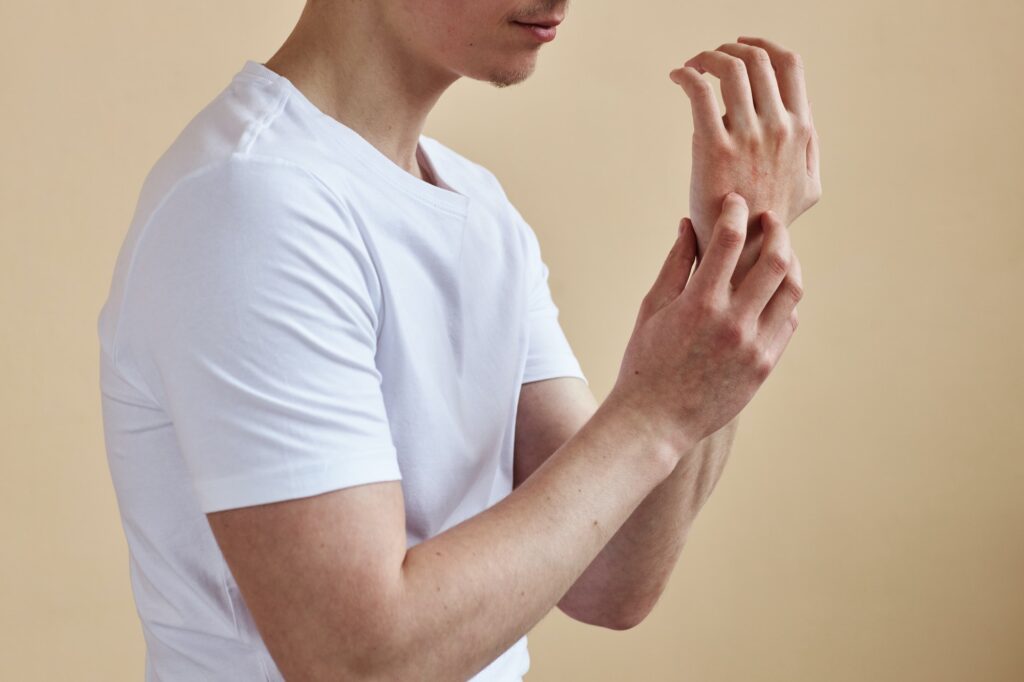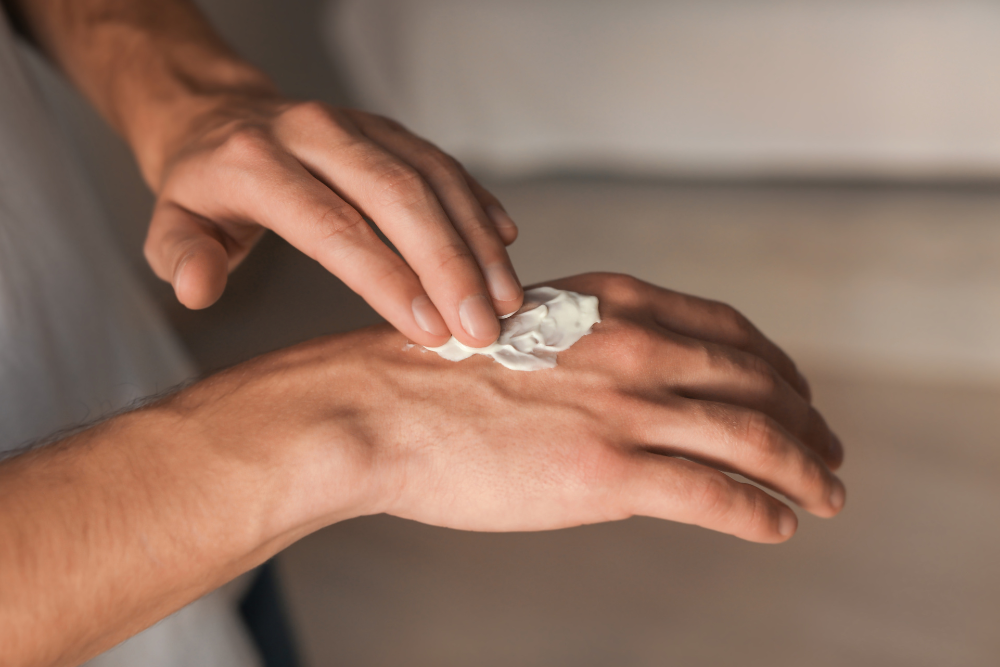Psoriasis typically appears as thick, red patches with silvery scales, often due to an overactive immune system. On the other hand, eczema tends to make your skin itchy and inflamed and is often tied to allergies or genetics. Knowing these distinctions can be a game-changer when managing and finding relief for your skin issues.¹,²
This article explores psoriasis and eczema, helping you understand the differences between these skin conditions so you can confidently manage their challenges. Join us to unravel the mysteries of psoriasis and eczema in dermatology.
Symptoms: How to Identify Psoriasis and Eczema
When distinguishing between psoriasis and eczema, understanding their symptoms is the first step. Both skin conditions can cause discomfort, but they manifest differently.
Psoriasis Symptoms
Psoriasis manifests uniquely in individuals, with symptoms typically emerging during young adulthood, though it can onset at any age. Approximately three-quarters of individuals with psoriasis develop symptoms before turning 45 years old.
The primary symptoms of plaque psoriasis often include dry, raised, red patches of skin (known as plaques) covered with silvery scales. These plaques commonly appear on areas like the knees, elbows, lower back, and scalp, although they can affect any part of the body. Psoriasis may also lead to nail changes such as pitting and discolouration.Some people also experience swollen, stiff or painful joints in what’s known as psoriatic arthritis.¹
Eczema Symptoms
Eczema typically presents as red, dry, and itchy patches of skin, which commonly appear in the creases of elbows, behind knees, and on wrists and ankles. These symptoms are prevalent in both adults and children. Children with atopic eczema may exhibit weeping, crusted dermatitis specifically on their face and neck.²

Causes: Unravelling the Triggers Behind Psoriasis and Eczema
Understanding the underlying causes and triggers of psoriasis and eczema is essential for effective management. While both conditions share similarities in terms of chronic skin diseases, their origins are distinct.
What Causes Psoriasis?
The exact cause of psoriasis remains unclear, but it is believed to stem from a genetic predisposition where the immune system of the skin reacts to certain triggers. These triggers can include infections like streptococcal tonsillitis, HIV, and other viral infections, as well as severe stress.
Factors such as smoking and excessive alcohol consumption are known to exacerbate psoriasis symptoms.
Having a family history of psoriasis increases the likelihood of developing the condition.
Certain medications can also trigger or worsen psoriasis, including lithium, beta-blockers, and anti-malarial drugs. If you are using corticosteroid medications, it’s important to work closely with your doctor to taper off the dosage gradually to prevent psoriasis flare-ups.¹
What Causes Eczema?
The precise cause of eczema remains unknown, but it often runs in families, suggesting a genetic predisposition. Individuals with atopic eczema may also have other allergic conditions such as hay fever or asthma.
While psoriasis is primarily driven by an overactive immune system and genetic predisposition, eczema results from genetic and environmental factors that lead to an inflammatory response and a compromised skin barrier. Understanding these distinct causes is essential in tailoring treatment approaches to manage and reduce the symptoms of these skin conditions effectively.²

Treatment Options: Managing Psoriasis and Eczema
When it comes to managing psoriasis and treating eczema, there are various treatment options available. The choice of treatment depends on the severity of the condition and individual factors.
Psoriasis Treatments
Psoriasis doesn’t have a cure, but there are numerous treatments available to manage symptoms and minimise flare-ups. Many people with psoriasis find that ongoing treatment is necessary to effectively control the condition.
Treatment for psoriasis typically involves three main approaches:
- Topical treatments applied directly to the skin in the form of creams or ointments, such as corticosteroid medications and coal tar.
- Light therapy, which includes ultraviolet (UV) phototherapy and photochemotherapy (PUVA).
- Systemic treatments that affect the entire body, including retinoids and biological medications derived from natural sources like microorganisms, plants, animals, or humans.
In addition to medical treatments, there are practical steps you can take to manage psoriasis effectively:
- Moisturise your skin daily using a recommended moisturiser.
- Adhere strictly to your prescribed treatment plan to prevent flare-ups.
- Reduce stress levels.
- Maintain a healthy lifestyle and follow a nutritious diet.
- Quit smoking and moderate alcohol consumption.
These combined efforts can help you better control psoriasis and improve your quality of life.¹
Eczema Treatments
While eczema cannot be cured, it can be effectively managed with various treatments. Steroid creams are commonly prescribed during flare-ups to alleviate symptoms.
Here are some general tips for managing eczema:
- Protect your skin by applying a moisturiser or emollient at least twice daily, even when your eczema is under control. Thick moisturisers or ointments are recommended.
- Wet dressings can help cool and rehydrate your skin, providing protection.
- During flare-ups, use ointments or creams as prescribed by your doctor. Steroid creams may be necessary, with weaker ones recommended for sensitive areas like the face, underarms, and groin, and stronger ones for other areas.
- Following your doctor’s instructions is key to minimising side effects, which are rare in both children and adults when used as directed.
- Manage itching with antihistamines, cold compresses, and by avoiding scratching. Periodic use of steroid creams under guidance can also help control itching.
- If infections occur, follow your doctor’s advice for antibiotics as prescribed.
- In severe cases, dermatologists may employ therapies such as ultraviolet light (PUVA) or systemic medications to reduce inflammation.
Many individuals notice improvements in eczema symptoms as they age. Regular consultation with healthcare providers can help tailor treatments to effectively manage eczema and improve quality of life.²
Both eczema and psoriasis can benefit from a holistic approach to treatment, which may include a combination of these options tailored to individual needs. Consulting with a healthcare provider or dermatologist is essential to determine the most effective treatment plan for your specific condition.

Prevention Strategies for Psoriasis and Eczema
Unfortunately, it’s not possible to prevent psoriasis. However, you can significantly reduce the likelihood of flare-ups by consistently taking the medications prescribed by your doctor. Regular use of prescribed treatments is key to managing the condition effectively.¹
For eczema, once you identify your eczema triggers, your doctor can help create a personalised eczema action plan to manage and minimise flare-ups.
Here are some strategies your doctor may recommend:
- Moisturising daily, even when your skin is clear, using moisturisers without chemical additives that could trigger eczema.
- Avoiding known triggers that exacerbate your eczema.
- Steering clear of products that can dry or damage your skin, such as harsh soaps or bubble baths.
- Taking lukewarm baths and showers instead of hot ones.
- Promptly rinsing off chlorine from swimming pools after swimming.
- Avoiding overheating and wearing wool directly against your skin.
Following these guidelines can help you effectively manage your eczema and reduce the frequency of flare-ups.²
Start your consultation now for psoriasis or eczema!
Sources
- Psoriasis | healthdirect. Available from: https://www.healthdirect.gov.au/psoriasis [Accessed 13 June 2024].
- Eczema – symptoms, causes and treatment | healthdirect. Available from: https://www.healthdirect.gov.au/eczema-symptoms-causes-and-treatment [Accessed 13 June 2024].





